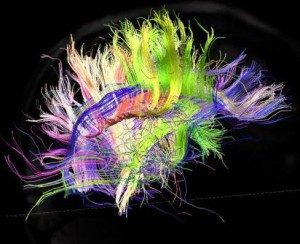9 January 2015. A clinical trial shows a synthetic form of insulin delivered with a nasal spray can improve memory functions of people with mild cognitive impairment and early Alzheimer’s disease. Results of the study led by gerontology professor Suzanne Craft of Wake Forest Baptist Medical Center in Winston-Salem, North Carolina appear in an advance issue of the Journal of Alzheimer’s Disease (paid subscription required).
Insulin, in addition to controlling blood sugar, is believed to play a role in parts of the brain regulating learning and memory, including an association between type 2 diabetes and risk of developing memory problems or Alzheimer’s disease. Insulin delivered through the blood stream, however, increases the risk for patients without diabetes of reducing their blood sugar too far or becoming resistant to insulin. Insulin delivered through the nose as drops or spray, however, can travel more directly to the brain, reducing those risks.
Craft — with colleagues from Veterans Affairs Puget Sound Health Care System, University of Washington School of Medicine, and Oregon Health Sciences University — followed up on their earlier research where regular insulin delivered through the nose showed promise in improving cognitive abilities of people with mild forms of Alzheimer’s disease. Natural insulin, however, has a short active life requiring more frequent doses.
Synthetic insulin, known as insulin detemir, is designed mainly for people with type 1 diabetes, an autoimmune inherited type of diabetes where the body is prevented from producing insulin, and thus need more a longer-acting version. People with diabetes normally inject insulin detemir once or twice a day under the skin. The drug is marketed as Levemir by Novo Nordisk.
In the new study, Craft and colleagues tested insulin detemir in two dose levels against a placebo in 60 patients with mild to moderate Alzheimer’s disease or mild cognitive impairment (MCI). Patients received daily either 40 or 20 standard international units of insulin detemir — international unit amounts vary depending on the biologic activity of the substance measured — or a placebo. The study measured the patients’ ability to retain verbal and visual information after 21 days, and looked as well for adverse reactions to the treatments.
The results show patients receiving the higher (40 unit) dose were able to remember more verbal and visual information than counterparts receiving the 20-unit dose or the placebo. Patients reported as well some minor adverse reactions to the insulin.
The researchers also measured the effects of nasal-spray treatments with patients carrying the APOE-e4 gene, highly associated with development of Alzheimer’s disease. The team found patients carrying the gene and receiving the 40-unit dose scored higher on the memory tests than their gene-carrying counterparts receiving the lower dose or placebo. Patients with the APOE-e4 gene overall scored higher on the memory tests than those without the gene.
“The study provides preliminary evidence that insulin detemir can provide effective treatment for people diagnosed with mild cognitive impairment and Alzheimer’s-related dementia similar to our previous work with regular insulin,” says Craft in a university statement. “We are also especially encouraged that we were able to improve memory for adults with MCI who have the APOE-e4 gene, as these patients are notoriously resistant to other therapies and interventions.”
Read more:
- AstraZeneca, Lilly Begin Alzheimer’s Drug Trial
- Lilly, AstraZeneca Collaborate on Alzheimer’s Drug
- NIH Funds $24 Million for Genetic Links to Alzheimer’s
- Portfolio Model Proposed for Funding Alzheimer’s Research
- IT Firm, University Partner on Alzheimer’s Research Platform
* * *


 RSS - Posts
RSS - Posts
[…] Trial Shows Synthetic Insulin Reduces Alzheimer’s Symptoms […]